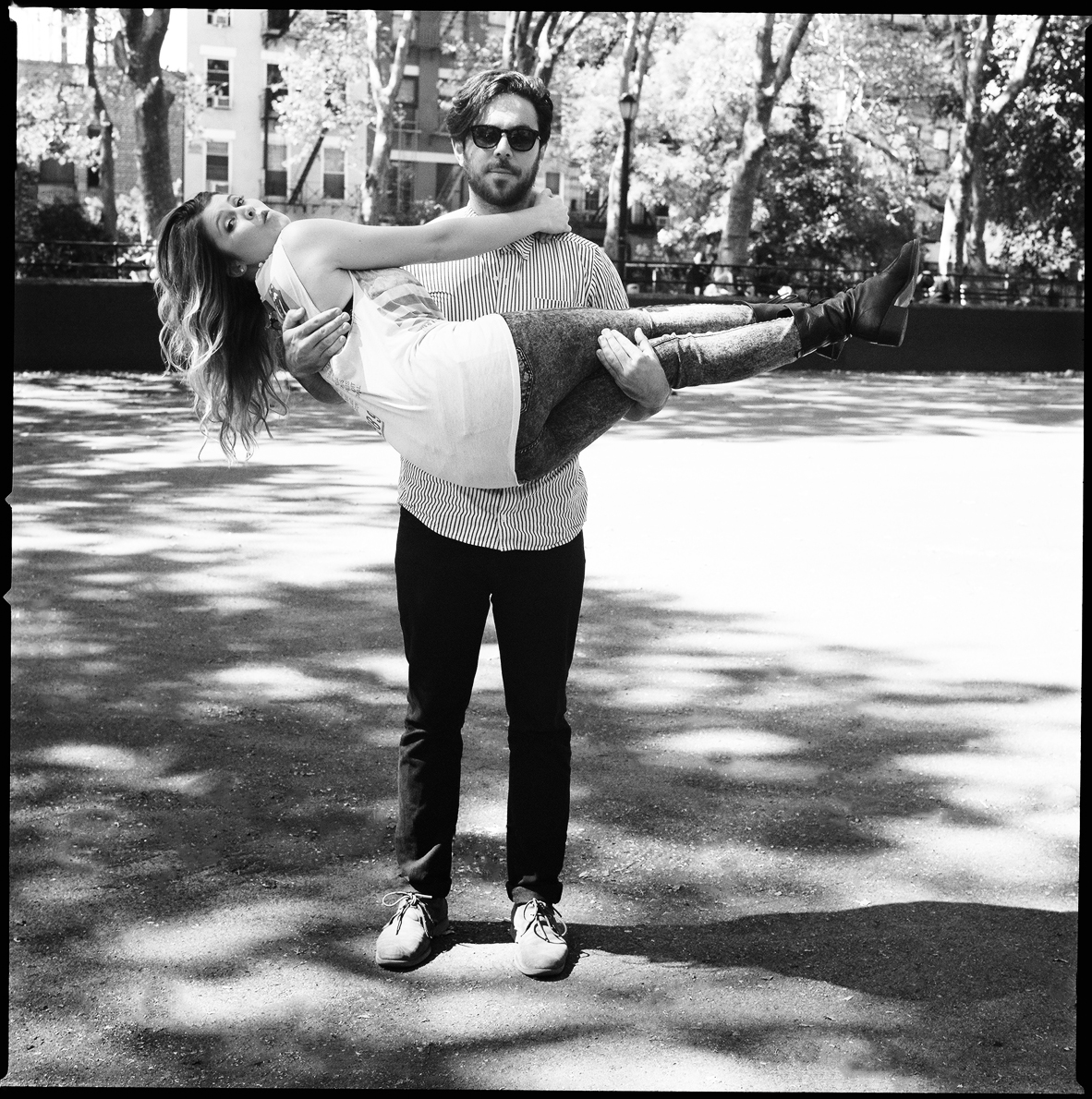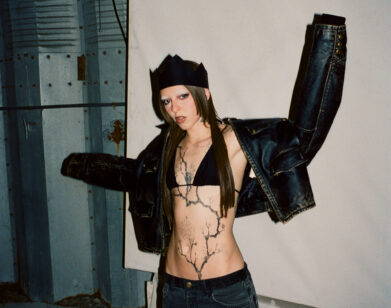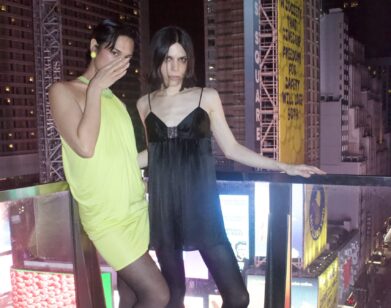Putting the Team in Milo Greene
Milo Greene the person does exist, but he is not among the five members of Milo Greene the band. Rather, the band is a very collaborative project: 20somethings Marlana Sheetz, Graham Fink, Andrew Heringer, Robbie Arnett, and Curtis Marrero swap instruments in between songs and all contribute to the vocals. The lyrics are sparse, but you do not realize this until you read them in the liner notes of Greene’s eponymous debut album. The band fills its songs with harmonious repetition—soothing and affectionate in “Perfectly Aligned,” laced with yearning in the single “1957.” It’s the sort of music you’d want to listen to driving on a dreary day—something to accompany introspection.”We wanted lots of vocals and wanted it to be really dreamy and kind of haunting,” Sheetz tells us over drinks on the Lower East Side. “Simplicity was key.”
We first discovered Milo Greene in concert. It was only a week after the release of its only album and the room was impressively packed. It seemed like a rare indie success story—they release an album and receive instaneous mainstream recognition, playing on the Late Show with David Letterman and flooding the press—but Sheetz and her bandmate Fink tell us that their rise does not feel particularly. Every one of the five members was in a band prior to Milo Greene, floundering in the West Coast music scene, never quite reaching the necessary level of success (you know, the kind that enables you to eat).
Interview recently met with Sheetz and Fink in New York. Topics of conversation ranged from electric shocks to dirty songs, fans, and the pain of quitting a band.
EMMA BROWN: I know that you were all in bands before you formed Milo Greene, and that you left to form it. Is it difficult to quit a band?
GRAHAM FINK: I think it depends. When Milo Greene got going we were very quickly aware that it made sense to [give it] our full attention. For my old band, we had hit a place that we had plateaud. There wasn’t any growth.
MARLANA SHEETZ: I think that’s the place where all of our bands were. You work really, really hard for so long and then at some point, if you’re not really seeing any progress, you have to either make a big change or move on, and we did both. It’s really hard; it was really emotional for all of us, because those projects before this band were like our heart and soul, our baby projects, the things we worked on for years and years and years and then to just give up on it, it’s hard, for sure. But the prospects of this band and the potential that it had was so much greater, so it was more exciting than it was upsetting.
BROWN: When you join or start your first band as an adult, do you do so thinking, “I’ll do this until it’s not fun anymore?” Or do you think, “We’re going to be together forever!”
FINK: This is actually the 10-year anniversary of when I started my first band—that I was with up until this band got started two years ago. So there is a lot of history there. I started as a kid, as a 15-year-old.
SHEETZ: It’s always what I wanted to do, but I definitely gave myself a time limit: “If things haven’t started to progress by, like, my late 20s, 30s, I’m probably going to move on.” I would always do something in music, [but] not necessarily play out and exhaust myself.
BROWN: I know that you all share instruments and switch instruments for each song. How do you decide who is going to play a certain instrument on a certain song?
SHEETZ: We wrote the songs and recorded them and then, after we had the songs recorded, we had to figure out how to play them live. It’s kind of weird how it works because sometimes whoever’s playing a certain instrument on a song live may not necessarily be the one who recorded it. Sometimes when we’re in rehearsal we’ll switch instruments ’cause it just doesn’t feel right.
BROWN: Do you like all of the instruments equally or is there one where you’re like, “Please don’t make me play that one”?
SHEETZ: [laughs] I was really resistant to keyboard for a very long time. I was like, “I do not want to be another girl in the band who plays the keyboard!” I was very, very resistant.
FINK: But now you love it.
SHEETZ: It’s all right. I would prefer to play bass a lot but I’m taking more of a liking to it now.
FINK: I’ve never been a keyboard player and even now I’m playing a keyboard on a song and percussion. We definitely share the roles.
SHEETZ: For the good of the band.
FINK: I’m really working up a bicep with that shaker…
SHEETZ: Yeah, where do you think I got these guns?
BROWN: I heard a lot about your album before it came out, and I went to one of your shows a few months ago, and the crowd was so excited about you. Have you had a “we’ve made it” moment?
SHEETZ: I’d say we’ve had a “we’re doing well” moment. [laughs]
FINK: [laughs] Yeah, [playing on David] Letterman was definitely [an], “Oh, this is something real happening here” moment.
SHEETZ: Recently we played in Madison, Wisconsin. We’d never been there, and we didn’t really know what to expect. When we got there and it was full of people, that’s a “we’re doing well” moment, when you can go to a city and the room is filled with people and you’ve never played there before.
FINK: We’ve had a few nights like that. It’s really a good feeling because we were all in other bands [and] there were definitely cities where you’d never played [before] and there would be, like, five people and a bartender.
BROWN: Describe your typical audience.
SHEETZ: We did our first national tour in support of The Civil Wars, so we have a lot of fans that are their fans.
FINK: It’s a nice range. There’s definitely 15- and 16-year-old girls and then 23- and 24-year-old guys in college—music college geeks—and then you’ve got like 50- to 70-year-old music fans that love Fleetwood Mac and Crosby, Stills, Nash and Young, who are Civil Wars fans. We just got a really long winded e-mail from a 65-year-old fan in Cleveland, Ohio talking about… I can’t, its hilarious.
SHEETZ: Andrew was briefly telling me about it. He attached a picture?
FINK: Yeah, a picture of you and Andrew behind the merch table. Our fans range from all ages.
BROWN: The same actor appears in all of your videos. Is he how you envision “Milo Greene”?
SHEETZ: That’s our friend Spencer, and we’ve told him time after time he is our Milo. Spencer is a very, very close friend, and he’s been around since this project began, since that very first recording session with Robbie, Andrew, and myself. He was always the first friend we would send demos to and be like, “What do you think?” We knew he wouldn’t bullshit us. The album art is a painting that’s in his house. It just seemed right to have him be the focal point in the videos. We look for him for inspiration sometimes so, indirectly, some songs may be about his life.
FINK: Or directly. [laughs]
SHEETZ: He’s been our number-one supporter.
BROWN: Is he a musician as well?
SHEETZ: He’s not a musician.
FINK: He’s a filmmaker. I really hope he gives up everything and becomes a professional dancer, because I’ve never been more impressed by a friend then the first time I saw him get out on the dance floor. It was like he’s having an out-of-body experience.
SHEETZ: It’s really hard to get a guy to dance sometimes, Graham is great.
FINK: Thank you.
SHEETZ: Graham and I are dance buddies. But for the rest of the guys in the band it’s kind of hard to get them to dance.
BROWN: When I saw you guys live, the strings broke on one of your guitars, and so you had to play a song on an electric, rather than accoustic, guitar. What’s the worst thing that has happened on stage?
FINK: Lollapalooza.
SHEETZ: No! You got electrocuted once. That was awful.
FINK: Oh, I did get electrocuted, that was really scary. We played at a hippie music festival in California and it was a little tavern—like a saloon bar that had a stage in it— and we were in the middle of one of our songs and [I] went up to the mic to sing and got fully electrocuted.
BROWN: Did you stop playing?
SHEETZ: He was totally in shock. Pun intended. [laughs]
FINK: We finished the set and that was it, but it was really scary. Then at Lollapalooza my guitar stopped working, which is the last thing you want to happen at your first major festival—a big pivotal moment.
SHEETZ: Yeah, it’s kind of a bummer. There’s something that goes wrong usually every night, it just depends on the scale—if it’s a big disaster or minor—but there haven’t been too many flawless shows.
BROWN: Do you have like a pre-performance pump up ritual?
SHEETZ: We absolutely do.
FINK: We’ve got a little song that we sing to get into the vibe. At a lot of shows we call a guy [who] was the intern at the studio where we did a lot of the record, and we get staged words of wisdom from him. He’ll give these haphazard, scatterbrain sayings that he makes up off the cusp. Philosophical things gone wrong.
BROWN: What do you sing? “Eye of the Tiger”?
FINK: It’s a song that I wrote, it is just a sweet little melody.
SHEETZ: It’s a little inappropriate, but it distracts any inhibitions or doubts that we have because it’s so ridiculous. It helps us relax, but it should not be repeated.
FINK: It’s got a parental advisory on it.
SHEETZ: The Civil Wars thought we were nuts because we would be singing it so loud and it would kind of go up to their dressing room. They loved it. They didn’t like to admit that they loved it, but they did.
BROWN: Last question: What’s a song that you wish you’d written?
FINK: Oh man…
SHEETZ: We play one [cover] pretty regularly in our set, it’s a Sufjan Stevens song. I know Andrew says he wishes he wrote it.
FINK: “Chicago.”
MILO GREENE ARE PLAYING AT HOUSING WORKS IN SOHO TONIGHT, OCTOBER 24 AT 9PM AND AT THE BOWERY BALLROOM TOMORROW, OCTOBER 25. FOR MORE INFORMATION ON THE BAND, VISIT ITS FACEBOOK PAGE.







